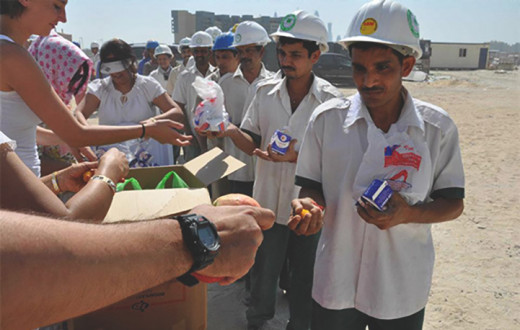Innledning
Utdanning er det første miljøet utenfor hjemmet hvor et barn lærer å samhandle med andre. Derfor er det svært viktig for skolemiljøet skal bli så hyggelig og vennlig som mulig.
Virkningen av utdanning på lokalsamfunn som tidligere ikke hadde tilgang til utdanning har vært Transformational. Våre programmer har aktivert foreldre til å erkjenne fordelene av utdanning og gitt dem nytt håp for sine barns fremtid. Våre programmer er også å skape en følelse av harmoni mellom ulike kulturer og etniske grupper.
Vi måler utdanning ikke bare gjennom faglig ytelse, men også gjennom den samlede suksess og tilfredshet for den enkelte. Vår helhetlige tilnærming som mål å utvikle barn til å utmerke seg i alle aspekter av livet - sosialt, psykisk og materielt. Metodikken fremmer kognitive, fysiske, emosjonelle, sosiale og åndelige vekst, og dermed fører til en utdanning som er fullført.
Første generasjons studenter
More than 28% of the Indian population is under 15 years of age. It is estimated that at least 60 million children have no access to early childhood education. Ensuring such large numbers receive education is a real challenge, made more complex with 68 percent of India's population considered rural and 8 percent classified as tribal.
With this harsh reality, we have set up and continue setting up more schools in under-developed areas spread across India. Each school is committed to providing value-based, quality education to all children, most of whom are first-generation students.
The Art of Living also addresses the socio-economic and cultural barriers that keep children away from school. Through medical camps, parent education workshops and hygiene awareness campaigns, families are encouraged to send their children to school.
Under its Care for Child or Gift a Smile programme, the Art of Living runs more than 117 schools in the tribal and rural belts of India, where child labour and poverty are widespread. Nearly 12,639 children from economically challenged areas benefit annually.
Stress-Free Schools
Students are encouraged to broaden their vision and deepen their roots by appreciating their own cultural heritage as well as that of other nations. They are provided with modern tools as well as the moral and spiritual strength needed to face the challenges of modern day living.
By combining formal education with life skills and nurturing human values (such as friendliness, compassion, caring and sharing), teachers create a holistic environment conducive to learning.
When the focus is not just academic, but all-round development of the child, children learn how to handle their emotions and are also able to develop lateral skills required to cope with different challenges in life.
Developing Communities
Giving children an education and a solid foundation for a successful future not only for the entire family, but also translates into the development of communities over time.
The villagers find solace in simply-constructed structures that serve as schools. Learning in open spaces, in the fields, under the trees, these schools have help to bring communities together and allowed them to dream of a life they would want for their children. This unity enables continual development and expansion of communities thus helping to bring them closer to achieve better life and to create a self-sustaining tribal community.
The continual development and expansion brings communities closer towards achieving a better life and creating a self-sustaining tribal community.
Additionally we also develop communities around schools. We do this by providing:
- Vocational Training for the parents of these children
- Free medical camps for the community
- Tree planting and reforestation
- Organic farming to improve crop yield








